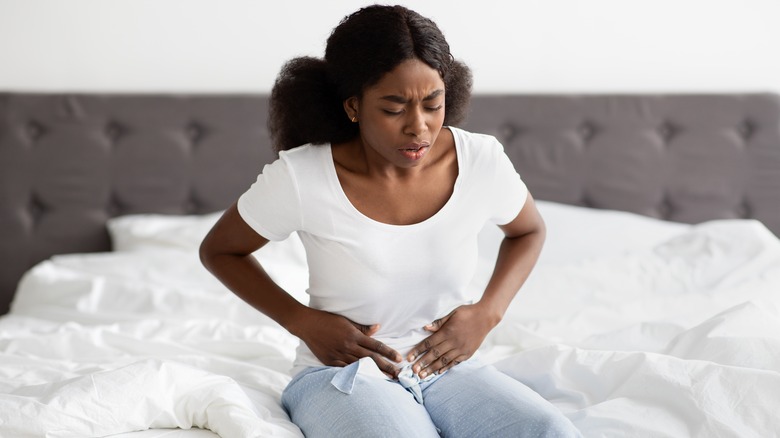Ways To Treat Longer Than Average Periods
Perhaps you're among the individuals who have an average length period, or maybe you're one of the lucky ones who experiences a shorter menstrual cycle. Either way, many women know from personal experience that periods can certainly be irritating and painful at times. Despite the inconvenience it can bring to our day, menstruation serves a meaningful biological purpose. Specifically, Planned Parenthood explains that a woman's menstrual cycle prepares her body for a potential pregnancy. If an egg is fertilized by a sperm cell, a woman will become pregnant, and her usual monthly period will cease for the duration of her pregnancy. When an egg is not fertilized by a sperm cell, the onset of a period is triggered as the body releases the thick lining of the uterus.
During adolescence, periods usually begin between the ages of 12 and 14, but a person can get their first period earlier or later. Following a first period, they typically last until a woman reaches menopause, which normally occurs between 45 and 55 years old. Every woman's menstrual cycle patterns are different and could even change over time. However, the average period lasts about three to seven days, according to Healthline.
Periods lasting more than a week are considered abnormal and are referred to as long periods. If you experience long periods, you may be wondering what steps you should take and if there's anything you can do to treat it. Luckily, there is.
Treatment can vary based on the cause
The most effective treatment method for prolonged bleeding will depend on the cause of the long period. However, birth control pills containing estrogen and progesterone may help in many cases of prolonged bleeding, explains Everyday Health. There are different forms of birth control that can be used to treat long periods, including pills, shots, intrauterine devices, and vaginal rings (per Healthline). In some cases, surgery may be recommended. For example, women without the desire to conceive in the future could consider having a hysterectomy to treat their long periods. In addition, thinning the layer of the uterus with a procedure called dilation and curettage can also minimize bleeding.
On the other hand, it's possible to utilize more natural remedies for those cases of prolonged bleeding caused by nutritional deficiencies, according to MedicineNet. Among these remedies is flaxseed tea, which balances out estrogen levels and lessens blood flow during menstruation. Additionally, it may help to consume foods rich in iron and drink plenty of water. However, these remedies aren't backed up by science. Therefore, it's crucial to speak to your doctor beforehand.
In any case, though, it's important to consult a doctor when experiencing a long period because they can be indicative of other health problems. For instance, long periods can be a sign of uterine fibroids, endometriosis, and polycystic ovary syndrome (PCOS), as per Everyday Health. In those cases, physicians can diagnose or rule out conditions, and help find the proper treatment option.


